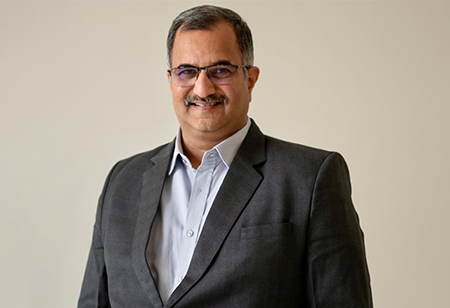Sunil Joshi, Managing Director, Getinge India

In an exclusive interview with India Pharma Outlook, Sunil Joshi, Managing Director, Getinge India, shares his insights on how intrapreneurial culture is changing how innovation is carried out within organizations, the demands of the market driving this unique phenomenon, and he also shares paradigm shift multinational companies have undergone to stay relevant in the markets. He has more than 28 years of all-around experience in the MedTech domain.
Given the evolving rate of intrapreneurship in the MedTech sector, how do you perceive this trend, and how are recent developments like digital transformation and personalized medicine enhancing the importance of MedTech?
Preparing new medical equipment is time and resource-intensive, but the data obtained from the patients through the equipment is extremely valuable; bringing digital transformation coupled with the latest innovations can be a game changer. This is where the industry is leaning towards Software as a medical device (SMD) to mitigate the long, drawn-out process. While this is not a major milestone, it is a continuum of existing innovation.
While in big pharma, the digital revolution has resulted in personalized drugs, its equivalent in medtech is a polished database which can support in informed decision making. Innovation of this nature cannot happen in labs. It must happen from the frontline where armadas of clinicians are giving patients care, as they are the ones capable of having a firsthand account of problems faced by the patients.
Intrapreneurship is a necessity here because last-mile deliverables are managed by service engineers and application specialists; their input is especially important to front-end developers. The digital transformation is happening on the field and not in R&D labs. This process is happeningfast compared to a decade ago. The digital revolution is skyrocketing the process towards intrapreneurial activities.
Could you elaborate on how MedTech companies foster a culture of intrapreneurship within their organizations and what strategies have proven most effective?
Established multinational companies with their years of experience and large capital expenditure for developing medical equipment and the manpower to accompany this are challenged by the startups of the current ecosystem. Young engineers aspire to disrupt the market with a quick and economical solution, and most of these are neither formal nor adequately validated.
This is where the role of large multinational companies comes into play, intrapreneurship culture is of the essence now, as anyone can take crucial data and profit from it. It is important that every company keeps an ear on the field and promptly responds to actions on the field. They are actively promoting the culture where everybody, from sales to everyone at the last mile,is treated as equal stakeholders inside the company.
An open feedback culture must be created where anyone, regardless of standing, can voice their ideas regardless of good and bad. The hierarchies of the past have become more fluid, the incoming workforce is very local with their out-of-the-box ideas and thought process. At the grassroots level, it starts from listening to the concerned people from a nonjudgmental perspective.
Considering the main challenges faced by intrapreneurs in the MedTech industry, such as regulatory and compliance hurdles, organizational resistance, and market uncertainty, how can organizations overcome these obstacles?
The biggest challenge for an intrapreneurial venture is not external. It is internal. Intrapreneurship is associated with the company and not a free entity. The reason they are called intrapreneur is because they are trying to change the mindset of the company from the inside, making them attempt practices that have never been done in the past. The senior management is averse to attempting something new which has no guarantee of success. Most of the challenges are from the company.
This is where patience and persistence come into play. Intrapreneurs must be data driven, analyze the market objectively and be prepared to tackle failure. Come to terms that there is no safe path, exercise caution when needed. This job is not in the limelight; most of these jobs are not known in the larger ecosystem, things may not move fast when needed, maturity of a certain level is necessary in the organization.
The regulatory system, when it comes to India is changing at a rapid pace as it is evolving at an alarming rate. Sometimes progress is so rapid that data collected for decision making becomes obsolete by the time a decision is made and enforced.
Overall, what is important for every organization to promote is we need to change the way of working. Changing mindset is something that is required for all organizations.
Looking ahead, what future developments or emerging trends do you foresee in the realm of intrapreneurship within the MedTech industry?
In India, there was a historic trend where students from premier institutes would go overseas for their R&D pursuits. The trend is now reversing, meritorious students are taking bold steps to start their own ventures. People with good qualifications are voluntarily joining the sales at the inception of their career to get a grasp at what the market is demanding. This experience is a significant stepping stone for their entrepreneurial venture.
To do something on their own or as part of a company, the common denominator for success is proximity to the customer. Roles like sales, marketing, technical support etc are being opted for by qualified individuals, which is quite an unprecedented change in recent times.
The government regulatory mentality has changed, they are ready to hear from the industry when they are making rules. Senior bureaucrats have relevant backgrounds who can understand the pain points of the industry. Currently, a lot of changes are happening because of the right people in the right places. All these are happening because of intrapreneurship.